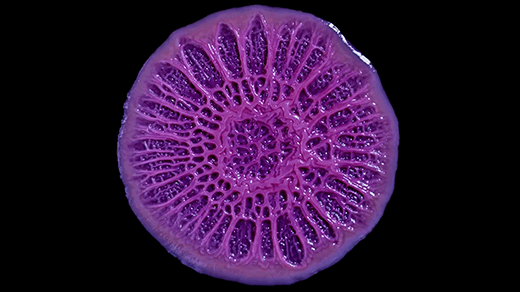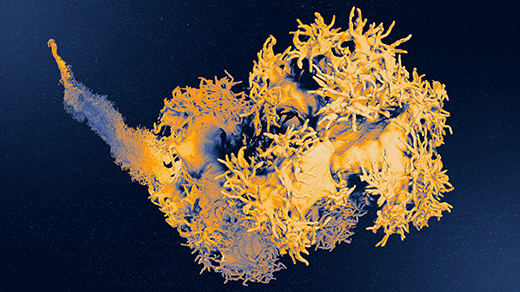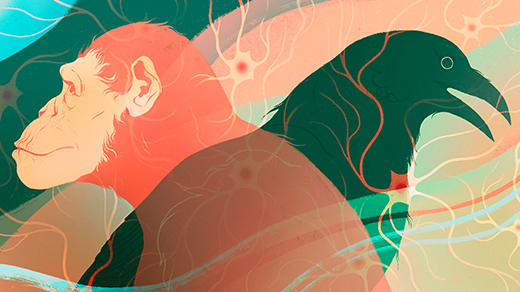Deep Secrets and the Thrill of Discovery
I have spent all of my adult life working in or running a biology research lab. It has been a very fulfilling, full-time pursuit. So when colleagues discover that I wrote a book that’s set in Paris and delves into such topics as the French Resistance, the Cold War and the author Albert Camus, they’re somewhat baffled. The looks on their faces seem to say: “Why the heck did you do that?”
I understand their concern. Perhaps they worry that I have abandoned the rigors of science.
Quantized
A monthly column in which top researchers explore the process of discovery. This month’s columnist, Sean B. Carroll, is a professor of molecular biology and genetics at the University of Wisconsin, Madison, and vice president for science education at the Howard Hughes Medical Institute. His new book The Serengeti Rules will be published in March by Princeton University Press.
So I try to reassure them. I first tell them that one of the principal characters in the story is a biologist — Jacques Monod, a well-known, Nobel Prize-winning co-founder of the field of molecular biology. Then I explain that Monod resisted the Nazi occupation during World War II, effectively criticized Soviet-style communism, and was friends with Camus. That seems to satisfy most.
But what I really want to tell them is how laboratory science and nonfiction writing have a lot more in common than they might think. Indeed, my experience in science helped to train me for writing. The process of researching a question — of testing hunches and digging for concrete evidence — is similar. And even better, the thrill of discovery is just as gratifying.
A good example unfolded one December morning in Paris in 2011. I made my way to the Prefecture of Police just a few blocks south of Notre Dame Cathedral on the Left Bank. After showing the guard my passport, she pointed me upstairs to their archives. I introduced myself to the receptionist and was offered a seat at a large, wooden table in a small reading room.
What was I, a biologist from Wisconsin, doing at the Paris Police Archives? I was playing a hunch — a hunch that those archives might hold documents that could help me fill a gap in the story I was writing. I knew that Monod was living in occupied Paris in the fall of 1940 and pursuing his doctorate in zoology at the Sorbonne. By examining his research notebooks, I found that during November of that year, he obtained the first glimpse of the phenomenon of enzyme induction in bacteria that would lead to his Nobel Prize 25 years later.
But I had also learned from other sources that Monod joined the Resistance that fall, and that he had experienced some sort of close brush with the authorities. What I didn’t know was how they caught on to him, or why he wasn’t punished while others were imprisoned and a few even executed.
It had taken me several months to find some clues and follow their trail to the Prefecture. The attendant brought me a box full of hand-labeled, rumpled brown folders. I started browsing the case files, hoping that one document might at least mention Monod. Inside a bulky folder, I found a list of people that the police had obtained from the interrogation of a suspect. There, fifteenth on the list, was Monod’s name and address. Goosebumps.
Then, to my amazement, I came upon an entire dossier with Monod’s name on it. Inside, on delicate, tissue-thin paper, was a handwritten document. Knocking 30 years of rust off my French, I figured out that it was a detective’s report. I struggled but was able to decipher that it was the policeman’s account of searches he made of Monod’s home and laboratory. Mon Dieu, I knew I had storyteller’s gold: new and dramatic details that no one had unearthed before.
A very pleasant and yet familiar feeling swept through me.
When had I felt this way before?
A handful of times during my research career, I have been lucky to experience or share a “eureka” moment (although that’s not a word I have ever heard in a lab — “holy sh**” is more likely). On each of these very rare occasions, something spectacular appeared in a microscope — something so unexpected that it made me call out to labmates or wake them up at home. And to make a victory run to the liquor store.
The unexpected part is really important. Anything worth doing in science is hard and usually takes a long time. The results are never guaranteed. So we don’t bother spending much time trying to imagine what every possible good outcome might look like. In my case, each moment of discovery was the visible result of an experiment — an image that we had never imagined, but once seen made us realize in an instant we had bolted into new territory.
The same phenomenon happened several times in the course of my research trips to Paris. Facing some crucial gap in the story, I would discover something that gave me more than I could have wished for. Each breakthrough came from playing a hunch, from trying to find missing data. And, as in science, sometimes I got a lot of help.
One of my toughest challenges was documenting the relationship between Monod and Camus. Despite all that had been written on Camus, there was virtually nothing to go on from his biographers. I asked Olivier Monod, one of Jacques’ twin sons (and a retired geologist), if he would please look at his father’s copies of Camus’ books to see if any had been inscribed by the author.
On a later trip to Paris, after visiting a former associate of his father’s, Olivier casually asked if we might go for a coffee? “Of course,” I answered. We dropped into the nearest café, and Olivier opened his briefcase. He handed me copies of two inscriptions that were not only warm and playful, but they were nine years apart.
I was ecstatic. Here was the first concrete evidence of the duration of the two men’s friendship.
Then, Olivier interrupted my babbling to say that when he opened one of the books, something fell out. Grinning, he handed over a letter from Camus to his father — with an even earlier date. My jaw dropped. The letter had been tucked into the book for more than 60 years. No one in the family had known it existed. Neither he nor I could have possibly seen that coming.
It got even better. In his letter Camus asked Monod for help with a delicate matter: His mistress’ father urgently needed medical care!
I jumped up and hugged Olivier. He didn’t see that coming either.
This article was reprinted on TheAtlantic.com.




